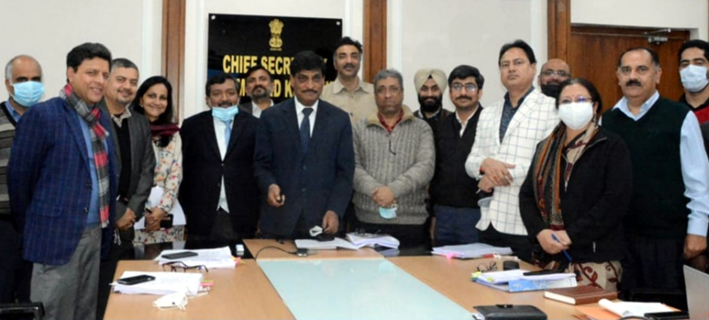UT Action Plan under NCAP approved
Excelsior Correspondent
JAMMU, Mar 4: Ushering an era of mobile governance in J&K, the Chief Secretary, Dr. Arun Kumar Mehta, today launched 25 e-services on the UMANG platform.
The UMANG unified mobile application for new age governance is a multi-lingual mobile platform for providing ‘any time-anywhere governance’.
Speaking on the occasion, Chief Secretary said that in sync with the vision of ‘APPKA MOBLE HAMARA DAFTAR’ the Government of J&K is committed to providing citizen centric services through the mobile mode. “This will enhance the accessibility of services and add to the convenience of citizens availing services”, he added.
The services on the UMANG platform are end to end digitized and provide a one-stop solution to the citizens starting from application for a service, its processing to receipt of certificates / permissions. The services being provided are integrated with online payment gateway and Rapid Assessment System (RAS) of digital feedback.
It was informed that henceforth 25 popular services like birth certificate, death certificate, rehri license, marriage certificate, income certificate, character certificate, dependent certificate, SC/ST RBA certificate etc. can be accessed by the public at https://web.umang.gov.in or by downloading mobile app ‘UMANG’ which is available on ‘Andriod’ and ‘IOS’ platform.
Among others Deeraj Kumar Gupta, Principal Secretary, Housing & Urban Development Department, Prerna Puri, Secretary, Information Technology Department, Amit Sharma, CEO, Jammu and Kashmir e-Governance Agency, Dr Rajinder Kumar Khajuria, Additional Secretary, Information Technology Department, Saleem Khan, Additional State Informatics Officer (SIO) were present on the occasion.
Meanwhile, Chief Secretary chaired the Apex Committee meeting and approved the action plan for implementing the National Clean Air Programme in Jammu and Kashmir.
Additional Chief Secretary, Health & Medical Education Department, Principal Secretary, Housing & Urban Development Department, Commissioner Secretary, Transport Department, Commissioner Secretary, Forest, Ecology & Environment Department along with Director, Ecology, Environment & Remote Sensing, Chairman and Member Secretary, Pollution Control Board (PCB) and concerned HoDs participated in the meeting.
The Chief Secretary emphasized the constant monitoring of air quality in Jammu and Kashmir and asked the Department to install a grid of Continuous Ambient Air Quality Monitoring Stations (CAAQMS) across all districts for real time assessment of PM10, PM2.5, SO2, NOx, NH3, CO, O3, and benzene in the Union territory.
Regarding the functioning of brick kilns, the Pollution Control Board has prescribed the use of adequate height of stacks, use of zig zag technology or vertical shaft, and use of coal/piped natural gas as fuel instead of charcoal and firewood; to check the air pollution associated with this sector.
The approved plan also includes a policy to set up e-waste and recycling units in industrial areas in compliance with the e-waste management rules. Accordingly, the Department of Industry and Commerce is assisting establishment of e-waste dismantling and recycling units in the existing and upcoming industrial park, estates and industrial clusters.
To assist the efforts towards curbing air pollution, a policy for phasing out old commercial and private vehicles in 10 years and 15 years respectively, has also been notified. Under the policy, the Transport Department is providing a subsidy of Rs.5.00 lakh per bus to encourage replacement with fuel efficient and eco-friendly alternatives.
The Chief Secretary asked the concerned agencies to tighten the inspection drives and ensure compliance to the PUC norms by the private and commercial vehicles.
Besides, the enforcement agencies were also directed to sternly deal with the construction debris and abandoned material as per the policy norms.
Dr. Mehta also impressed upon the Housing and Urban Development Department to ensure 100% door-to-door waste collection throughout Jammu and Kashmir, and expedite solid waste segregation for scientific disposal, in addition to strict implementation of single-use plastic ban.


